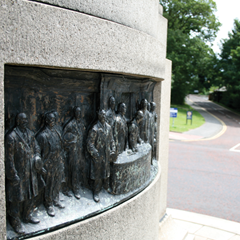The direction of devolution
 The NIO saw devolution as a step towards unity rather than protecting the union. Officials were also reluctant to devolve energy, in case Northern Ireland could not cope in a crisis.
The NIO saw devolution as a step towards unity rather than protecting the union. Officials were also reluctant to devolve energy, in case Northern Ireland could not cope in a crisis.
The sense of Northern Ireland as a ‘place apart’ stands out clearly in a discussion paper, produced by NIO civil servants in June 1980.
Northern Ireland, the document reads, “has always been treated differently” and devolution here would therefore not set an “awkward precedent” for the other parts of the UK.
A wide range of powers been previously been devolved but these had been “progressively constrained” by parity with Great Britain. The Secretary of State needed to keep charge of law and order and also have an “override power” in any field.
The Irish Government under Charles Haughey did not want a northern assembly to have law-making powers, as this “erects another obstacle to the creation of a Dublin/London axis and to eventual Irish unity or federation.” However, the paper’s authors thought “it would surely be in [the Republic’s] long term interests to preserve the separateness of NI law”.
In fact, unity was the original plan and officials saw devolution as undermining the union. The Government of Ireland Act “clearly envisaged the re-union of Ireland with the consent of the two Parliaments.”
Power-sharing was essential. The small number of Northern Ireland MPs (12 out of 635), first-past-the-post and the “sectarian structure” of local politics meant that nationalists were excluded at Westminster.
As one official wrote: “It is inherent in the concept of devolution that the minority community in Northern Ireland should participate in the process of legislation on transferred matters as well as in the process of administration.”
Another paper warned that “unforeseen developments” could make a transferred matter “too difficult for an NI administration to handle”. The writer had the oil price explosion, recession and the resulting increase in local electricity prices in mind.
Later that year, trade unionists from ICTU raised Northern Ireland’s energy problems directly with Margaret Thatcher. In a meeting on 6 August, a J Cosby said an energy policy for the province was “urgently needed” and called for an interconnector to sell electricity to the Republic.
Officials had warned that this would be blown up but trade unionists pointed out that the authorities “managed to maintain the rail link.” They also opposed the closing down of the gas industry and wanted Northern Ireland to benefit from North Sea gas via a pipeline.
Thatcher recognised that consumers were paying for excess electricity and “hoped very much that it would be possible to build an interconnector with the Republic, though the security problems could not be ignored.” She understood that the gas industry was losing £200,000 per week which “could not be allowed to continue” but a comprehensive review of energy policy was underway.
Public Record Office of Northern Ireland references:
CENT 1/9/18 CENT 1/9/30 CENT 1/9/30A





